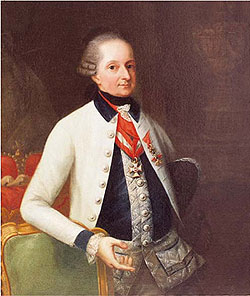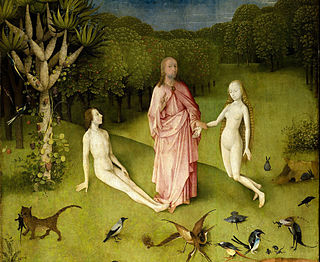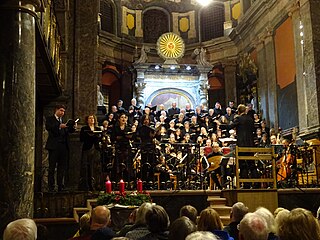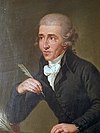Related Research Articles

Joseph Haydn's Symphony No. 13 in D major was written in 1763 for the orchestra of Haydn's patron, Prince Nikolaus Esterházy, in Eisenstadt.

Sir Roger Arthur Carver Norrington is an English conductor. He is known for historically informed performances of Baroque, Classical and Romantic music.
Sinfonia concertante is an orchestral work, normally in several movements, in which one or more solo instruments contrast with the full orchestra. It emerged as a musical form during the Classical period of Western music from the Baroque concerto grosso. Sinfonia concertante encompasses the symphony and the concerto genres, a concerto in that soloists are on prominent display, and a symphony in that the soloists are nonetheless discernibly a part of the total ensemble and not preeminent. Sinfonia concertante is the ancestor of the double and triple concerti of the Romantic period corresponding approximately to the 19th century.

Nikolaus I, Prince Esterházy was a Hungarian prince, a member of the famous Esterházy family. His building of palaces, extravagant clothing, and taste for opera and other grand musical productions led to his being given the title "the Magnificent". He is remembered as the principal employer of the composer Joseph Haydn.

The Symphony No. 101 in D major is the ninth of the twelve London symphonies written by Joseph Haydn. It is popularly known as The Clock because of the "ticking" rhythm throughout the second movement.

Richard Henry Tudor "Harry" Christophers CBE FRSCM is an English conductor.

The Paris symphonies are a group of six symphonies written by Joseph Haydn commissioned by the Chevalier de Saint-Georges, music director of the orchestra the Concert de la Loge Olympique, on behalf of its sponsor, Count D'Ogny, Grandmaster of the Masonic Loge Olympique. Beginning on 11 January 1786, the symphonies were performed by the Olympique in the Salle des Gardes du Corps of the Tuileries, conducted by Saint-Georges.
A double bass concerto is a notated musical composition, usually in three parts or movements, for a solo double bass accompanied by an orchestra. Bass concertos typically require an advanced level of technique, as they often use very high-register passages, harmonics, challenging scale and arpeggio lines and difficult bowing techniques. Music students typically play bass concerti with the orchestral part played by a pianist who reads from an orchestral reduction.

Joseph Haydn's Symphony No. 31 in D major, Hoboken I/31, was composed in 1765 for Haydn's patron Nikolaus Esterházy. It is nicknamed the "Hornsignal" symphony, because it gives a prominent role to an unusually large horn section, i.e. four players. Probably because of its prominent obbligato writing for the horns, in Paris, the publisher Sieber published this symphony as a "symphonie concertante" around 1785.

The Deutsche Kammerphilharmonie Bremen is a chamber orchestra based in Bremen (Germany), with place of residence in the historical building Stadtwaage.

Joseph Haydn's Symphony No. 29 in E major, Hoboken I/29, was written in 1765, just after his 28th, and to be performed in Eisenstadt, under the benign auspices of Prince Nikolaus Esterházy.
Alexander Lonquich is a German classical pianist and conductor.

The Creation, the oratorio by Joseph Haydn, is structured in three parts. He composed it in 1796–1798 on German text as Die Schöpfung. The work is set for soloists, chorus and orchestra. Its movements are listed in tables for their form, voice, key, tempo marking, time signature and source.
The Symphony in D major, Op. 23, is the only work in this genre by the Bohemian-born composer Jan Václav Voříšek. He wrote it in 1821 at age 30; he died young, at only 34.

Idsteiner Kantorei is a mixed choir in Idstein, Rheingau-Taunus-Kreis, Germany. The group performs regularly in the Protestant Unionskirche in services and concerts, also in smaller churches of the region and internationally. They practice collaboration with other choirs for larger projects.

Carsten Koch is a German organist, choral conductor and academic. He is the church musician at the Unionskirche in Idstein, Hesse, conducting the concert choir Idsteiner Kantorei and the orchestra Nassauische Kammerphilharmonie that he founded. He lectured orchestral conducting at the Frankfurt University of Music and Performing Arts.
Peter Lika is a German bass in opera and concert, focused on both oratorio singing as on historically informed performances.

Tanja Tetzlaff is a German cellist. She played first as an orchestra member, but then as a soloist, a founding member of the Tetzlaff Quartet, a string quartet led by her brother Christian Tetzlaff, and as a chamber musician. She has recorded cello concertos and chamber music, including contemporary music, and has appeared internationally.
Claudius Traunfellner is an Austrian conductor.
Andreas Frölich is a German pianist and teacher at the Hochschule für Musik und Tanz Köln.
References
- ↑ Joseph Haydn Kammerphilharmonie Orchester (in German)
